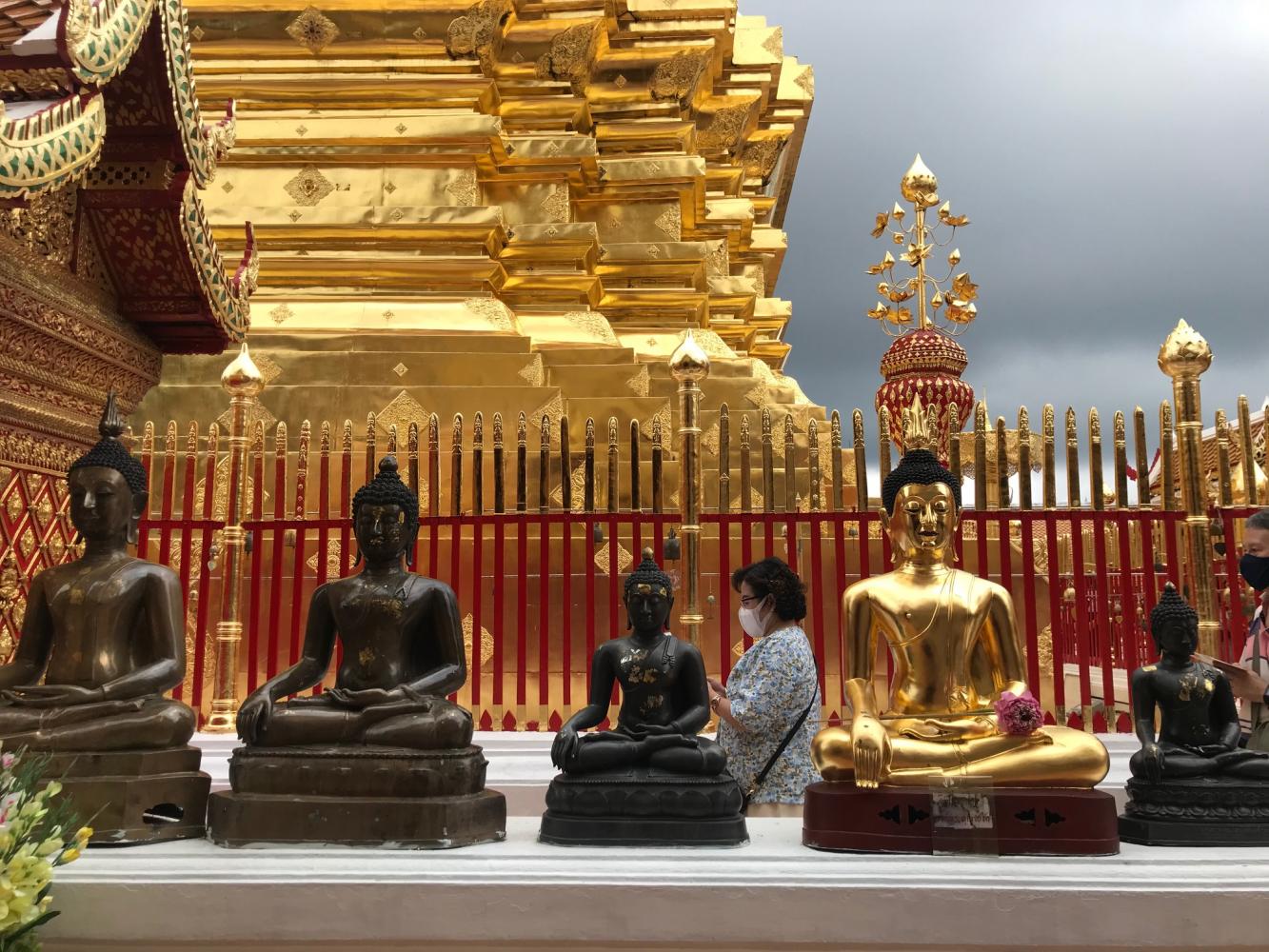
With an empty queue in front of Wat Phra Singh in Chiang Mai, Trairong Thongtem was sitting in his driver seat, waiting patiently for tourists to hire a round-trip service to Doi Suthep.
From an average of 3-4 rounds daily prior to the pandemic, now only one round per day is the average, as some red truck drivers sharing the same route have already given up and taken temporary leave.
Mr Trairong is among countless workers in tourism-related businesses whose jobs have been impacted by the pandemic in the past eight months.
Chiang Mai recorded 100 billion baht in revenue from 10.8 million visitors in 2019, of which 70% were Thais and 30% foreigners.
Every year, when the cold winds start to blow, the northern province becomes one of the busiest destinations for locals.
But this year it could be a dismal season as Chiang Mai will miss out on international arrivals, with travel restrictions remaining rigid in the kingdom.
Pakkanan Winijchai, director of the Tourism Authority of Thailand's Chiang Mai office, said the province has witnessed slow international demand since the Phuket boat accident in 2018 shattered tourist confidence, particularly among Chinese guests who accounted for one-third of overall international arrivals.
Thailand is on the verge of launching the special tourist visa, receiving requests from Chinese travellers who want to take long-stay trips in the country.
But Chiang Mai, like many provinces in Thailand, cannot directly benefit from this scheme, as there are no certified alternative local state quarantine hotels in the area to host those compulsory stays at this moment.

Tourists make the rounds at Wat Phra That Doi Suthep, Chiang Mai.
The tourism industry here has to wait until guests complete quarantine in other provinces before visiting their destinations as a secondary choice.
While there was public outcry in some provinces in the South when it was named a primary destination for the first batch of tourists, Ms Pakkanan believes such circumstances would not happen in Chiang Mai.
"Tourism revenue contributes 68% of the province's GDP. The pandemic not only affected tourism, but also wider stakeholders in the economy," she said.
"People would be glad to welcome tourists back again."
Ms Pakkanan said while the province has to face uncertainty regarding the international market, the tourism industry can gear up for domestic tourists by introducing events and promotions that will help draw visitors.
TAT has launched a stimulus campaign by creating five routes across all regions of Thailand with the aim of promoting the readiness of many destinations for those who want to travel, but are hesitant because of health safety concerns.
The pilot project saw 250 travellers join the programme, with the end of the journey in Chiang Mai last month where it helped airlines, hotels, tour service and transport operators generate revenue.
HIGH AND DRY
Anantorn Hochindarat, president of the Tourism Association of Chiang Mai, said tourists vanished during the lockdown in April.
Soon after the relaxation of restrictions, local guest levels were only 20% from the same period last year.
Only 35% of hotels have reopened, with most reporting weaker occupancy rates and lower average daily rates, and the vast majority of tourism-related businesses such as tour agencies, bus services, souvenir stores, restaurants and spas remain closed, said Mr Anantorn.
"Over 1,000 tour guides are unemployed, while dozens of hotels have been put on sale after owners faced a liquidity crisis," he said.
The build-up before the high season might look impressive with the number of domestic trips in August tallying 373,000, just 2.37% shy of the same period last year.
Average occupancy for hotels in August tallied 41.6%, higher than the eight-month average of 33.7%, a positive sign of recovery for the province famous for winter holidays.
But a point of concern is the revenue from domestic tourists, which lagged behind the growth in numbers.
Total expenditure in August was 31% weaker than the same month last year, while accumulated numbers for domestic receipts from January to August plunged 48% to 20 billion baht.
Average spending per head dropped 13.8% to 7,928 baht per trip.
Mr Anantorn said while Chiang Mai has around 10,000 remaining international travellers, local hotel owners cannot earn much from this group, especially Chinese tourists who mostly stay in condos or rental houses owned by Chinese investors.
"As the international market is stalled, if Chiang Mai can simply get the same chunk of the domestic market back within a year, typically 70% of the total, we should be happy enough," he said.
FLIGHT TROUBLE
Rangsee Ruanson, vice-president of the Association of Northern Tourism Federation, said the province used to have over 15 international direct flights on a daily basis prior to the pandemic.
But even though international travellers have expressed their interest to visit Chiang Mai in the near future, it's very difficult to bring in tourists as flights may not be profitable.
"To maintain a healthy profit, airlines should have a balance of inbound and outbound passengers," said Mr Rangsee.
"But as Thais cannot venture out and international tourists must stay longer in Thailand before boarding a jet back home, there's a slim chance of organising a practical plan for the inbound market who want to fly here direct."
Without international travellers, he predicted operators who rely heavily on foreigners will suffer the most.
For instance, bus and van owners are now starting to sell their vehicles at extraordinary low prices.
"The market price for a five-year-old van was around 600,000 baht, but despite lowering the selling price to 300,000 baht, they are still hard to sell," said Mr Rangsee.
"This is a painful situation for us all."